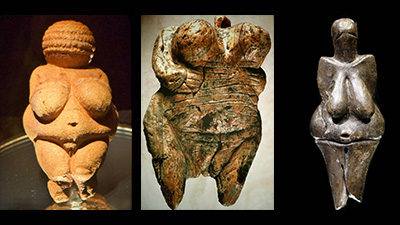Foraging Societies
Teacher Resources
Driving Question: How did foragers build and maintain their communities?
Foraging—sometimes called hunting and gathering—required a great deal of knowledge and skill. This lesson explores the communities and networks that helped foragers thrive for hundreds of thousands of years.
Learning Objectives:
- Understand the characteristics of foraging communities.
- Investigate how historians can develop understandings of early human cultures.
- Evaluate the importance of language development for early human societies.
Vocab Terms:
- culture
- egalitarian
- forager
- migration
- nomadic
- sedentism
- symbolic
Opener: Foraging Societies
To teach this lesson step, refer to page 2 of the Lesson 2.3 Teaching Guide.
Ever been stumped by a question? Sometimes it’s less about not knowing the answer to the question than it is about understanding the question in the first place!
The Life of a Forager
To teach this lesson step, refer to page 3 of the Lesson 2.3 Teaching Guide.
OER Project teachers love the Foraging Simulation. Learn about how other teachers plan and execute this activity here.
What happens when you run out of resources? Where do you go? What do you do?
Hunter-Gatherer Societies
To teach this lesson step, refer to page 5 of the Lesson 2.3 Teaching Guide.
The OER Project Writing Guide gives a detailed explanation of the importance of student writing in our courses.
Did you know that people who live in cities still hunt and forage? Although foraging isn’t as common as it was back in the days of early humans, the skill may be a necessary one, depending on the availability of resources to a community.
-
Guiding Questions
-
Before you read
Preview the questions below, and then skim the article. Be sure to look at the section headings and any images.
While you read
Look for answers to these questions:
- What are four generalizations historians can make about foragers?
- How has recent research called some of these generalizations into question?
- Why were there probably a lot of similarities between foraging societies?
- What were some challenges that early foragers faced?
- How do we know that foragers shared culture between groups?
After you read
Respond to this question: How does this article support, extend, or challenge your understanding of the communities and networks frames?
Language
To teach this lesson step, refer to page 6 of the Lesson 2.3 Teaching Guide.
This fan-favorite activity is the brainchild of an OER Project teacher. Learn more about classroom implementation here.
Humans’ ability to communicate through symbolic language is necessary for collective learning, and it helped our species grow and expand across the globe.
Closer: Foraging Societies
To teach this lesson step, refer to page 7 of the Lesson 2.3 Teaching Guide.
Informal writing is a mainstay of our courses. Learn why in this overview.
Now that you’ve learned about foraging societies, it’s time to return to the prompt from the beginning of the lesson.
Language Networks
To teach this lesson step, refer to page 7 of the Lesson 2.3 Teaching Guide.
Have you ever wondered about the origins of our modern notions of communication? How did we develop our language and social skills? What do they mean for our survival?
-
Guiding Questions
-
Before you watch
Preview the questions below, and then review the transcript.
While you watch
Look for answers to these questions:
- What is a language network?
- What personal evidence does Sharika Crawford give that language shapes the way she experiences the world?
- How did the geography, climate, and history of Latin America shape how communities and networks formed around language?
- What does the story of the Yiddish language tell us about the ways languages can expand and decline in use?
After you watch
Respond to these questions: What language networks are you a member of? How does language connect members of those networks?




